





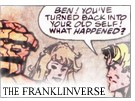

 |
 |
 |
 |
 |
 |
 |
 |
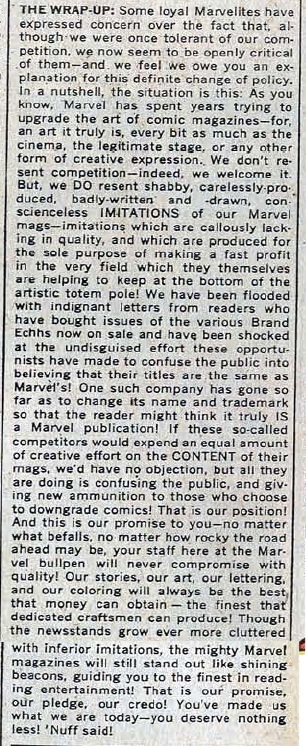
Cynics might say this is just an excuse to hit the opposition, but what Marvel did was genuinely different, and arose from more than an attempt to make a fast buck. Stan and Jack and Steve put far more into a twelve cent comic than was justified by either industry standards or pay rates. Every successful business, when it is producing its very best material, has a genuine passion for quality.
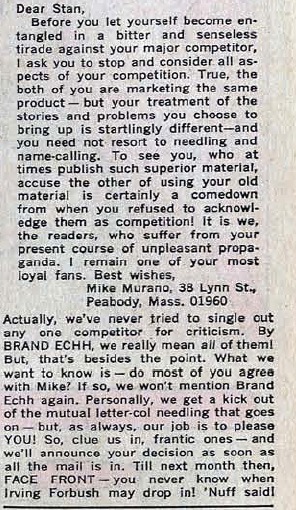
Stan saw his job as pleasing fans, so he listened and acted.
Also in FF52: fans want realism:
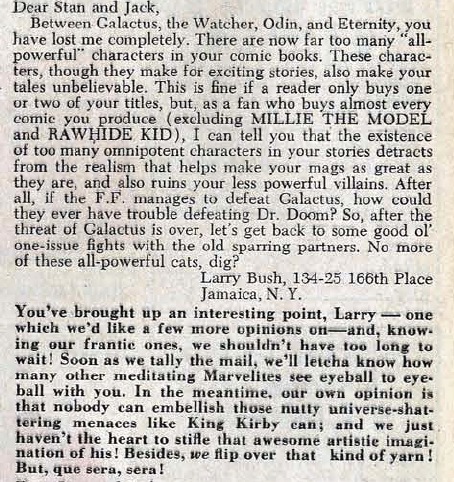
The formula for great comics is simple (incredible exploits plus down to earth realism), but getting it right it very difficult!
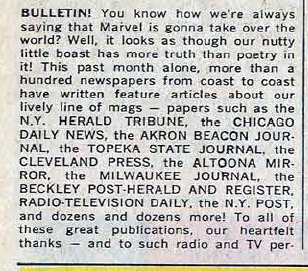
More than one hundred newspaper in one month. Which month?
there's a
three month turnaround for letters to be printed, so that would be
FF50, the Galactus saga. If you produce great comics, people will
notice.
Also in FF53, a letter from Denny O'Neil - a future writer, but
he's already working for Marvel. :)
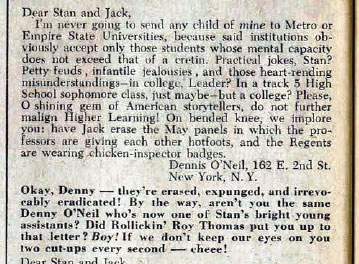
Also in FF53, about merchandising:

The merchandising increases. Eventually it will earn more than the comics, and characters will be discouraged from changing too much. The writing is on the wall.
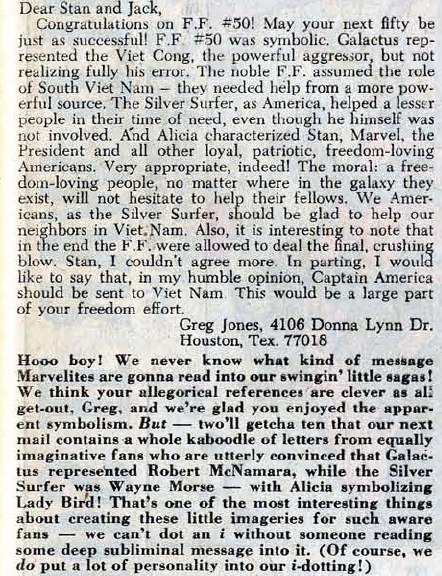
A good example of how great literature naturally reflects eternal themes, and will be particularly relevant to how those themes are expressed in politics at the time.
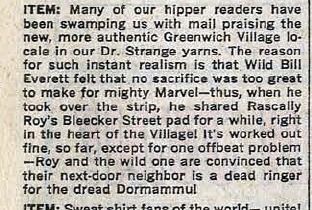
The locations are based on the real world. Stuff like that matters.

The readers matter as individuals.
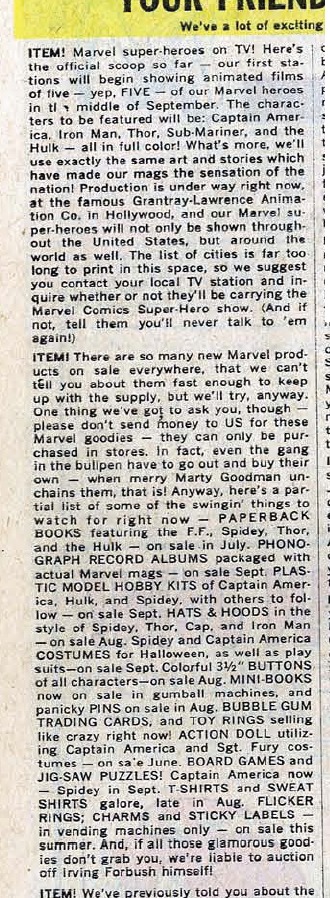
Merchandising is always more noticing than the comics, especially when it's on TV A huge market, free advertising, and money with no outlay. The comics themselves become a smaller part of the revenue stream.
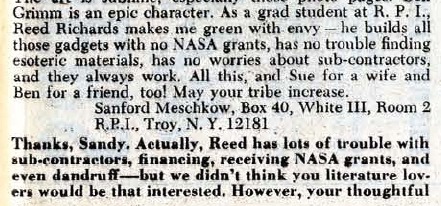
Love the reply :)
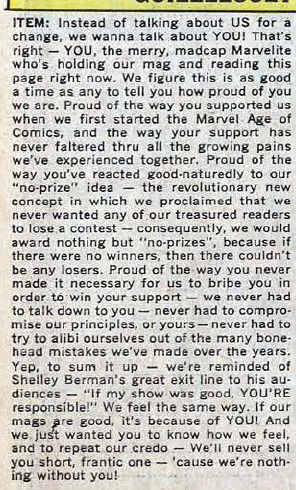
Contrast this with the usual "make a comic and see who bites" approach. The readers feel like they are on the inside, so continue to give detailed feedback, resulting in comics that more closely reflect the national mood.
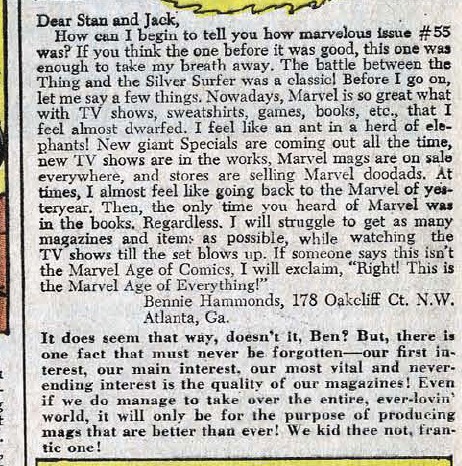
The comics still come first. But for how long? Ultimately, Martin Goodman was in charge, not Stan, and his eye is on short term profit.

Clearly the tone is humorous, yet it is certainly true. Stan and Jack are too busy writing the comics to endlessly re-read back issues. The sincerity of the replies to letters indicates that he genuinely listens to their pinions: sometimes in later years the replies have a corporate, make-no-promises tone, and the difference is stark.
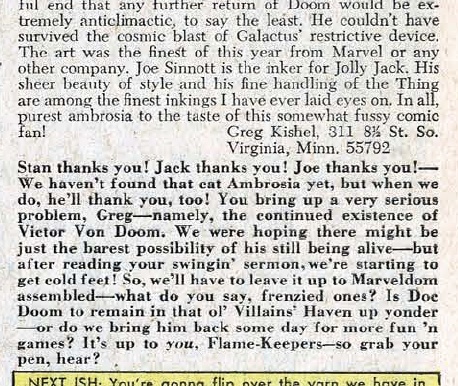
Note the stark contrast with modern times:
"...the characters. Always the
characters! They're the Bread and Butter of Marvel Comics. The
characters are the most important thing we have."
- Ralph Macchio, "Comics Creators on Fantastic Four" page 177.
In the classic era Stan was happy to ditch the most valuable characters if the readers wanted. All that mattered was responding to present needs: the current characters' situation, the readers' response. The characters themselves had no other value on their own.
Also in FF64, concerning UK comics:
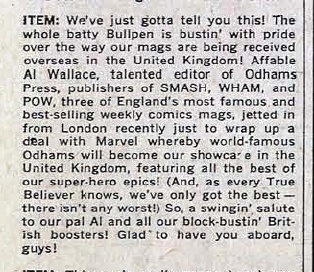
This is included because I live in he UK and remember seeing these a few years later. Some of these "Power" comics were superb, among the best comics ever. Others were badly re-edited (so new readers would not know what was going on) and mixed with far inferior comics. Sadly the lazier forms prevailed and they didn't last long.
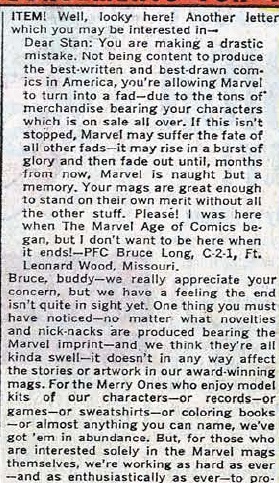
This was true at the time - the comics were better than they had ever been - but the warning was prophetic. When merchandising makes more money than comics then the comics exist only to serve the merchandising.
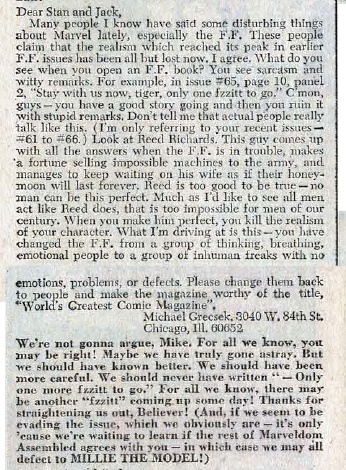
The reader is actually very astute. Reed is indeed trying to do more than is humanly possible. But at this time the magic formula means realism is not yet in danger. Reed's impossible demands will eventually led to a long period of decline.
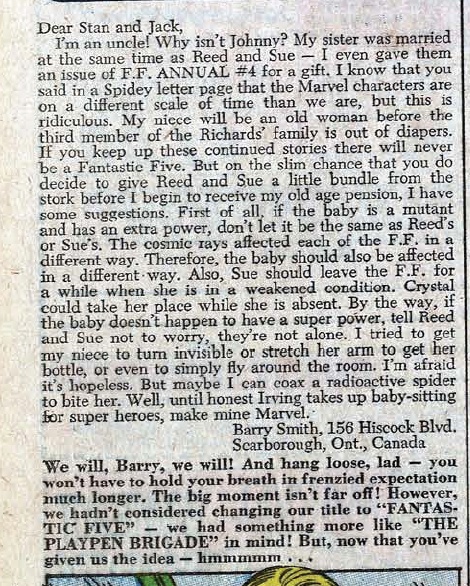
Notice that the reader suggests Crystal replaces Sue in the team. She does this in FF81. Stan never usually plans that far ahead, so he may have done it in response to this reader. If so, thanks Barry, we owe you!
As for the complaint, at this point it is still possible to see the stories as taking place in real time, on average (stretching in some months is balanced by compressing in others). But the pressure is building. Or perhaps Franklin is operating from within the womb? He fears change so I guess it's only natural that he delays being born.
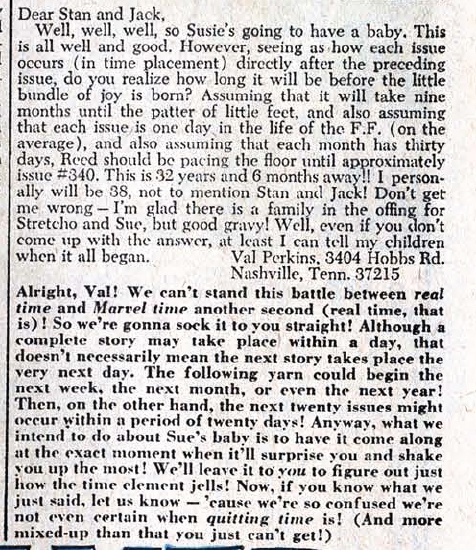
At this point real time is still possible: as Stan says, there's
plenty of flexibility at this early date. Marvel Time does not become unavoidable
until 1973, when we see Franklin clearly and he is much
younger than he should be.
... who later became a famous comics professional:
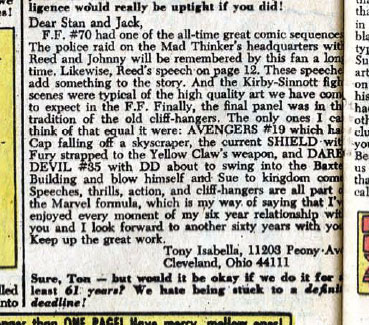
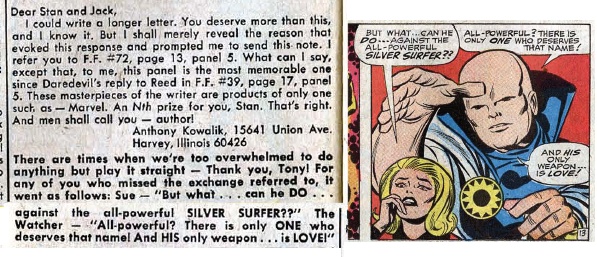
Classic stuff. Comics should move people.
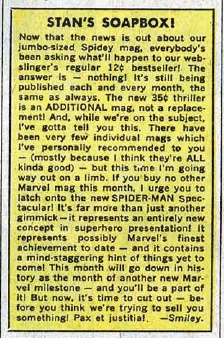
The 35 cent magazine appears to have disappeared without trace after just a few issues. Interestingly, after inflation this would be around $2.99 today, the same price as current comics. The normal 12 cent comics would be around 95 cents today. As we see today, overpriced comics do not well well, and low priced comics only sell if they have great content, as they did in the early days of the Fantastic Four.
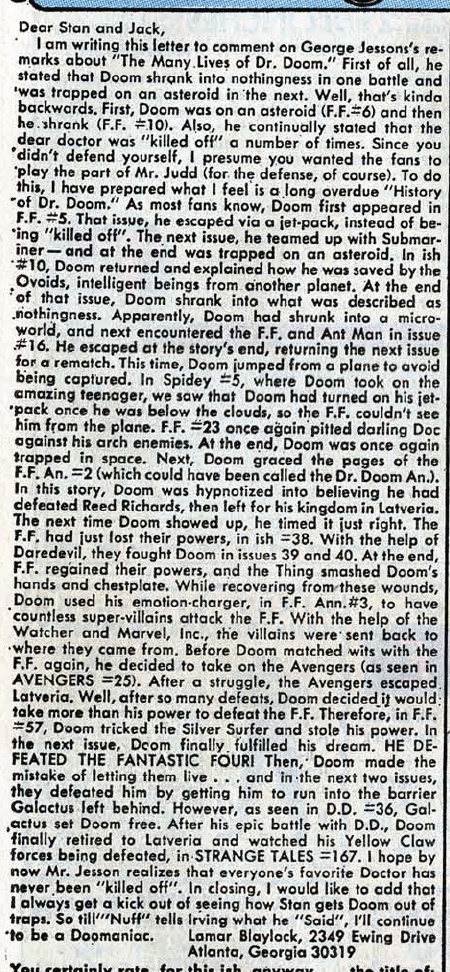
This provides some important background to how Doom's character evolved: from wanting world domination to gradually scaling back and focusing on Latveria. These are not just random battles, they build into a coherent whole.
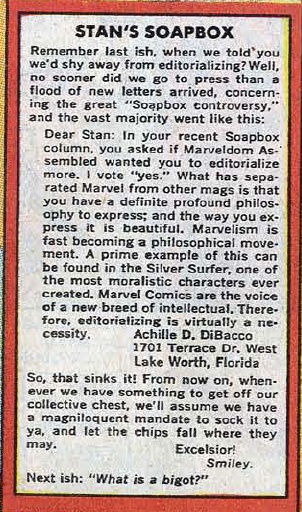
Notice that the first topic he wants to address is bigotry. This
is
the zeitgeist at the time: an era of great racial tension. Stan
has to
be very careful how he deals with it (it's the easiest thing in
the
world for a racist to just stop reading a 12 cent comic), but it's
at the front of his mind. This is two years after the Black
Panther,
whose title predated the political movement of the same name.
Also in FF90: a letter from Don McGregor, later a well known
comics professional. Later fans comment with a smile that his
comic writing was equally verbose:
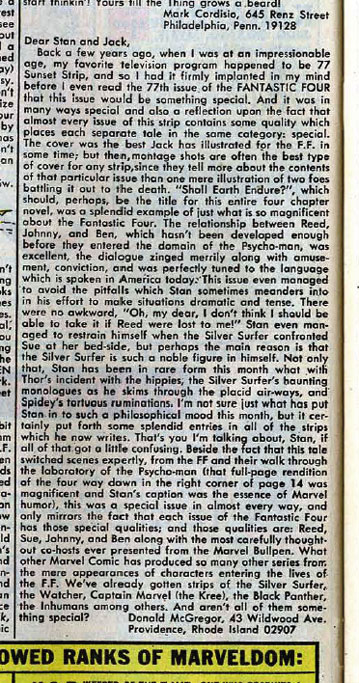
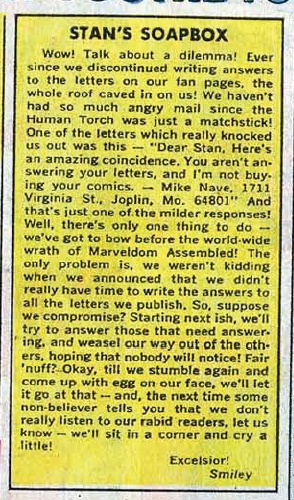
You cannot afford to take readers for granted! Note the implication that at this stage, Stan is still replying to a lot of letters himself (so is Flo Steinberg, if I recall correctly)
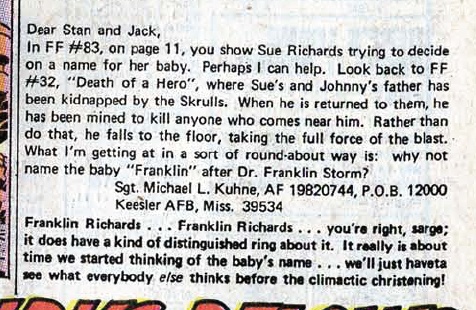
Like I said, the Fantastic Four is a collaborative process
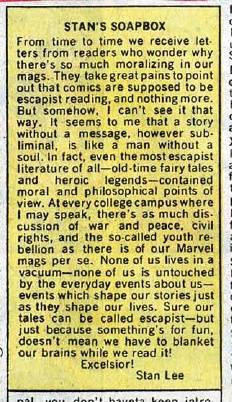
These stories matter.
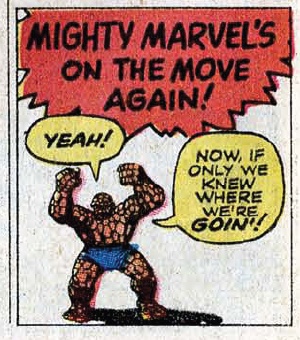
This is the Marvel Explosion of 1968. They did not know where they were going, which is not a problem, but they took their eye off the ball (they neglected quality), which is a problem.
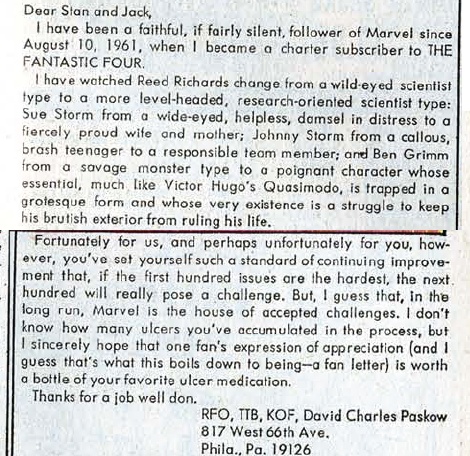
He says it better than I could.
Also in FF99: Marvel still listens to its readers
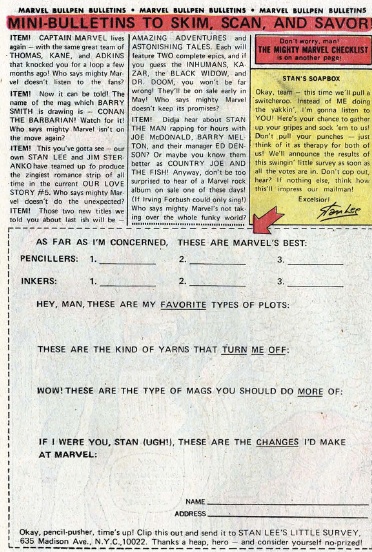
There are so any readers now that the letters alone are not
enough, they need a survey to get a broader picture.
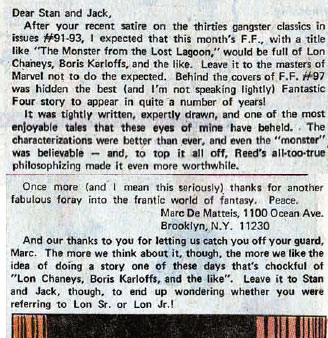
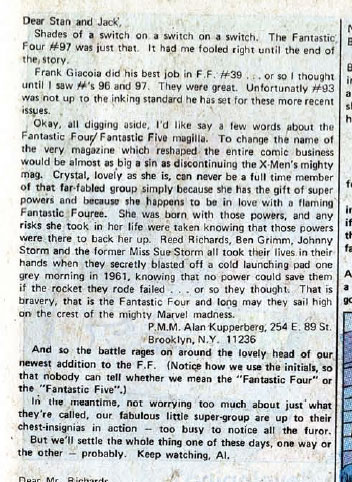
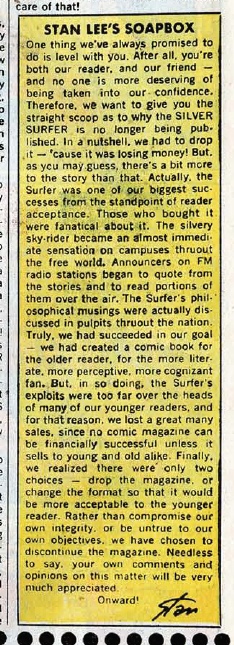
This is why the FF works and the Surfer's mag didn't. (Though also because the surfer's mag was poorer value, the stories felt decompressed.) The regular FF magazine has the same message as as the Surfer's mag, but those messages are subliminal. People do not like being preached to,
In the Surfer's mag he would say something like "why must men oppress each other?" And in the Fantastic Four we see "villains" oppressing others (obviously) but also we subtly see how Reed holds the others back without realizing it. This is a much deeper message: bad things often happen because we do not realize what we are doing. So the Surfer, with his preaching, ceased publication while the Fantastic Four, with its more subtle message, thrives.

it's not just a comic, folks.
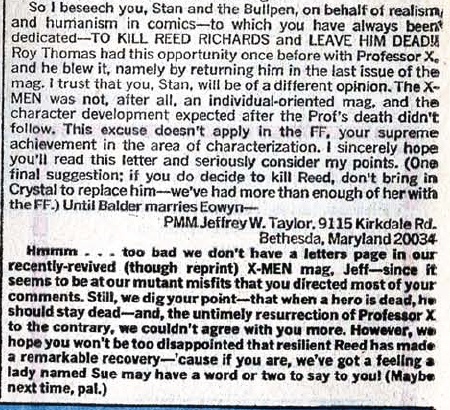
Resurrecting characters became a sign of the end of continuity: today comic death means nothing, but back then it was a very big deal. The writer is also correct that Reed could not return to his previous state: he had moved on. But instead of dying, Reed needed to work through his issues so that Sue could have her final triumph. Sadly the stretching timescale meant this period, Act 4, took almost twenty years (it should have taken just four!)
Regarding Crystal, as a huge fan of the Exquisite Elemental I am tempted to disagree, but he is basically right: Johnny is not ready for her, and she has no place in the team as just a fifth wheel. She needs to be out in front, and that must wait.
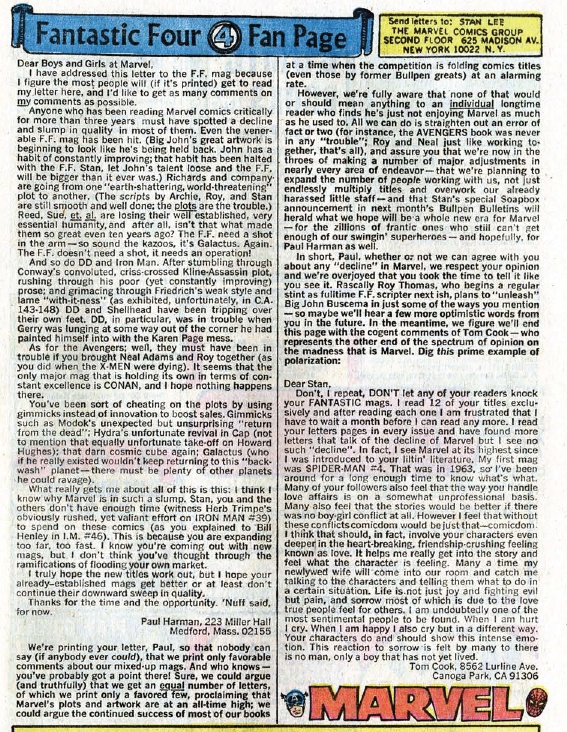
By 125 we are well into the Marvel Explosion, and Marvel Time, and the stretched out fourth act. The comic is still incredible and realistic, but the good stuff is stretched thinner, resulting in fewer sales. The corporate response is to expand, which will just spread everything thinner.
This signals the end of the classic period, when everything was done right (more or less) so this is a good time to sign off.
Maybe one day I'll add a part 3. :)The Franklinverse era saw two fatal changes to the reader-writer relationship:
The rise of the Internet made letters pages obsolete. But the lower cost of writing meant that writers received a flood of mail, disproportionately from rabid fan boys. So writers sound weary, sometimes dismissive of fans.
Comics are now sold through specialist shops, so only existing fans matter. Casual fans grow older, drift away, and are not replaced, leaving only hardcore fans who will buy regardless of what happens and don't mind the loss of continuity.
So modern comics are sometimes (always?) hostile to new readers. Sean Kleefeld found this when he took a two year break from the Fantastic Four and then could not understand what was going on.
"I kept getting the feeling
that I
was trying to climb over the walls of some secret club that only
really
wanted people who were already members. There was a reluctance
to
letting outsiders in, even with my only having been an outsider
for a
very short time. 'Nope. You said [you] weren't going to read
this comic
any more, so we're going to make sure you have to work your ass
off to
get back in.' ...bear in mind that prior to 2008, I had
read and
absorbed not only every issue of every Fantastic Four title
every
published, but the vast majority of FF appearances in any title
... I
had Mark Waid asking me continuity questions when he was writing
the
book. I have a long and deep investment in the characters, but I
still
felt like that book was written for people who have never
stopped
reading the title." -
Sean Kleefeld
